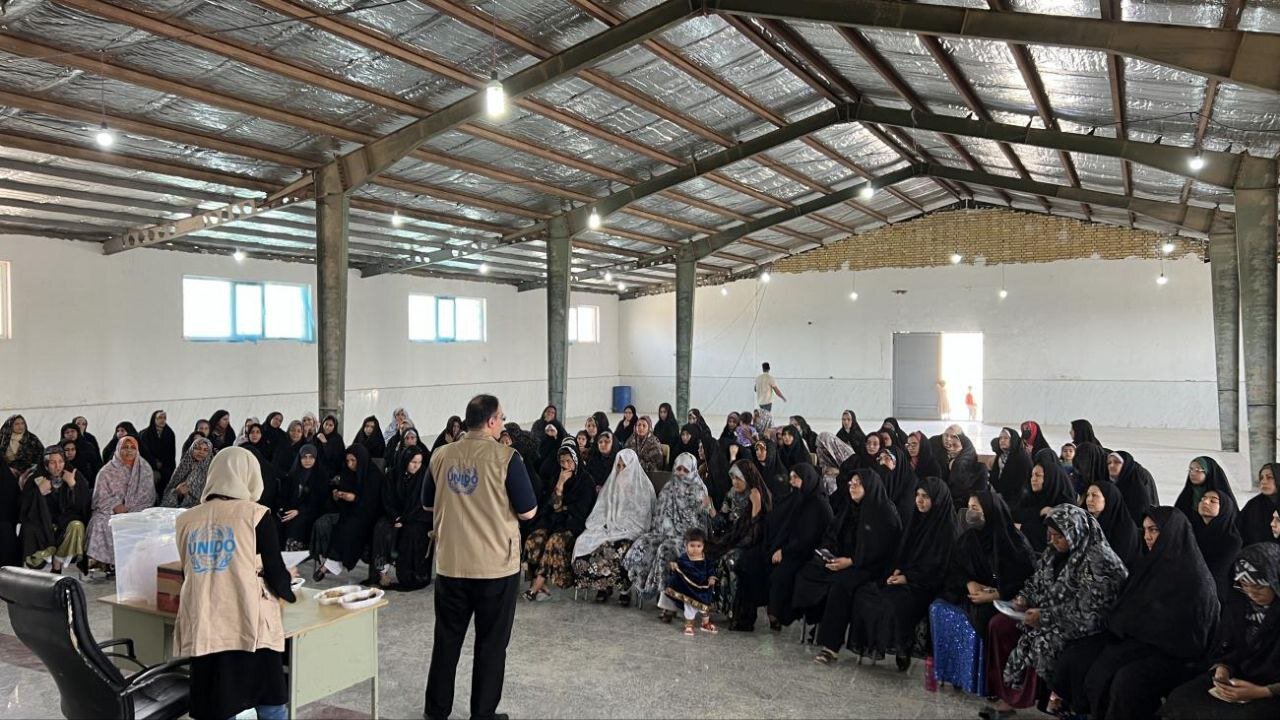UNIDO to foster resilience, environmental responsibility among refugees

TEHRAN – Supported by the Government of the Republic of Korea, the United Nations Industrial Development Organization (UNIDO) seeks to foster environmentally sustainable communities by promoting waste recycling and composting practices, thereby strengthening resilience and environmental stewardship in refugee settlements.
Since 2020, UNIDO has been dedicated to enhancing the resilience and well-being of refugees in Iran through innovative projects aligned with the host government's strategies and Sustainable Development Goals, the UN website announced in a press release on July 27.
Building on this momentum, the ongoing initiative ‘Sustainable Waste Management in Semnan Settlement’ under the project of “Scaling up Sustainable Settlements for Refugees in the Islamic Republic of Iran’ aims to empower refugees to become active agents of change.
A notable milestone took place on May 7, 2025, when a comprehensive waste management training focused on home-scale vermicomposting was held at the Semnan refugee settlement.
The training saw the enthusiastic participation of 133 refugees, including 127 women and 6 men, spanning various age groups—34 participants (approximately 16 percent) aged 13-25, 44 participants (around 20 percent) aged 26-35, and 55 participants (about 25 percent) aged 36-58—reflecting broad community engagement across generations.
During the event, refugees learned how to transform organic waste into valuable fertilizer through vermicomposting, promoting sustainable waste disposal and enhancing agricultural productivity at home.
Many expressed eagerness to implement these practices, which contribute significantly to reducing waste, improving food security, and fostering environmental stewardship within their community.
Among the inspiring stories is that of Mojdeh, a 13-year-old girl and the youngest refugee participant in the training. She was eager to learn how to transform organic waste into valuable fertilizer and demonstrated remarkable enthusiasm for environmental practices.
Mojdeh said, “I want to help my community by recycling waste and making our environment cleaner. I believe even young people can make a difference. This project is also giving me the chance to build new skills and connect with others, helping me grow both personally and socially.”
Her interest and dedication exemplify how young community members are taking ownership of sustainability efforts and inspiring others to follow suit. Her enthusiasm highlights the potential of empowering youth as key drivers of positive change in their communities.
The training received strong positive feedback, with approximately 52 percent of participants rating the content as “Very Good” and about 54 percent expressing confidence in the instructor’s expertise. Most felt the session met their expectations and appreciated the clarity of delivery.
Overall, the feedback highlighted excellent organization, engaging trainers, and a successful session. This feedback underscores the effectiveness of the program and the community’s enthusiasm for sustainable practices. It reflects a community eager to adopt new skills—empowering refugees not only to improve their living conditions but also to become ambassadors of sustainability.
Thanks to initiatives like the waste management training, community members are seeing tangible improvements in their environmental practices and living conditions. UNIDO plans to expand these programs in support of the host country to other settlements in 2025 and beyond.
Building on these efforts, the project is currently implementing renewable energy solutions in the settlements of Semnan and Torbat-e Jam. Specifically, UNIDO is installing two solar power plants, each with a capacity of 200 kWp, to provide clean and reliable electricity to the communities.
These installations aim to reduce dependence on traditional energy sources, lower carbon emissions, and enhance the overall living conditions of both refugees and host communities. By integrating renewable technologies, the project promotes sustainable development, supports energy independence, and contributes to climate resilience in the region.
Authorized refugees won’t be deported
Interior Minister Eskandar Momeni has said the country is not planning to deport documented and authorized refugees.
“We are only deporting the two million Afghans who are illegally residing in Iran,” he said.
“Iran is not an anti-immigrant country, as it is hosting six million foreign nationals. Since the beginning of the current Iranian year (March 21), some 800,000 out of the two million undocumented refugees left the country,” ISNA quoted Momeni as saying on July 18.
“These are honorable people who have contributed to the country’s production. Based on regulations, unauthorized refugees must leave the country. If they wish to live here, they have to follow legal procedures,” the official further noted.
From March 21 to June 27, a total of 717,658 Afghans have returned to Afghanistan; more than 80 percent of them have left the country voluntarily.
According to the head of the National Organization for Migration, Nader Yar-Ahmadi, there has been no change in the residency and the kind of services provided to documented Afghans residing in the country.
On the contrary, they will benefit from more services as illegal nationals leave the country, IRNA reported.
“The majority of these nationals are employees or students; we normally consider employment as a foundation for residency in our long-term planning,” IRNA quoted Yar-Ahmadi as saying.
The official went on to say that the presence of illegal migrants in any country poses many challenges, and in critical situations, they will be the main suspects. Their presence negatively impacts the economy, social, and security sectors.
Global experience has shown that migrants at most can account for three percent of the population of any country. With Iran’s population estimated to reach around 90 million next year, the figure will amount to three million migrants. Currently, there are more than 6.1 million nationals living in the country, which should gradually decrease, Yar-Ahmadi added.
MT/MG
Leave a Comment